#code geass comparisons
Text
Shitty Parent vs. REALLY Shitty Parent

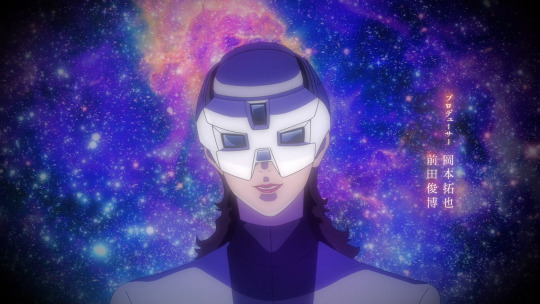
So I think this latest episode has finally given us a pretty good idea as to how Prospera Mercury and Delling Rembran act as dramatic foils to one another as the respective parents of our two main characters.


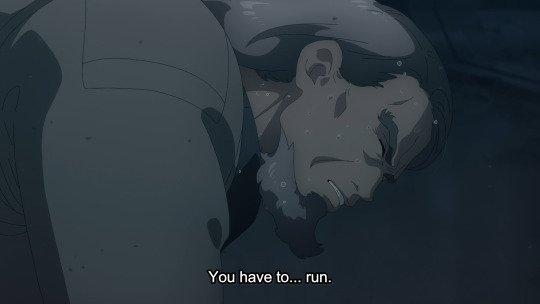
On the one hand, while it’s been hinted at ever since Episode 7, this episode confirms that Delling does genuinely care for his daughter underneath all that distant, aloof demeanor he’s always showing. We seem him in this episode take a proverbial bullet for Miorine at what was very nearly the cost of his own life, all while telling her to save herself.
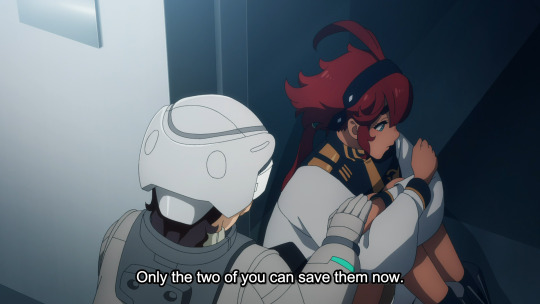

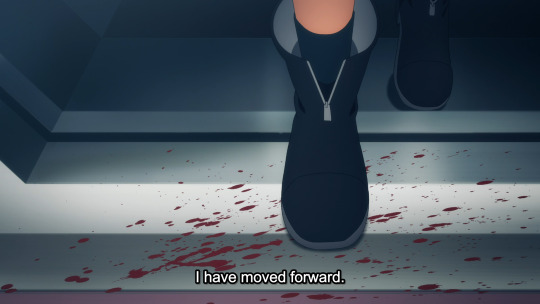
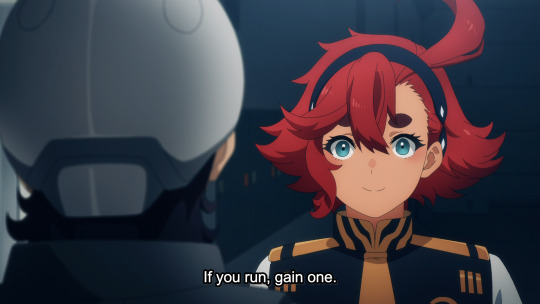
And on the flipside, this episode also seems to have given us a hint of the true scope of what seems to be Prospera’s manipulation of Suletta. How despite the open care and affection Prospera shows Suletta, it’s clear that she’s also been manipulating and grooming Suletta into becoming an outright killing machine who brutally cuts down her enemies without batting an eye. To the point where it even seems like Prospera may have even subjected Suletta to outright psychological conditioning and indoctrination, given how Suletta bounces back from a major traumatic breakdown once Prospera said a certain phrase to her.
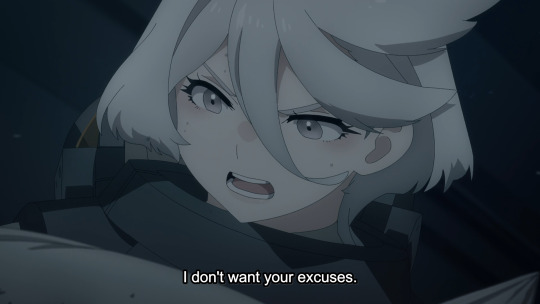

Now this isn’t to say something like ‘Psyche! Delling was actually a good parent all along and it’s PROSPERA who was the terrible parent!’. Delling is still absolutely a shitty father, plus it’s been pretty clear that Prospera wasn’t going to be a ‘good’ parent given how she’s acted shady as fuck basically from day one, particularly is you read the Star Cradle short story.
Rather, what I think we’re seeing here is that rather than the full-blown antagonistic, villainous ‘Big Bad’ parent he may have been initially set up as, Delling is more simply the ‘dysfunctional’ variety of shitty parent. IE; the kind who’s always loved and cared deep down for their child but has never been able to show it due to their own baggage/trauma/ego.


Essentially, Delling seems to have a lot in common with Gendo Ikari, complete with a tragic dead wife.
In contrast, in we’re continuing the Evangelion parallels, then Prospera could be likened to one of the darker interpretations of YUI, as the protagonists mother who acts loving and caring but is actually the true mastermind behind everything in the story. Not to mention if Eri really is in Aerial, it would basically be the Unit 01 situation just flipped on its head.
Or put another way if we look at a previous work of G-Witch’s writer: Delling is a subversive take on Charles Zi Britannia who turns out to not actually be the big bad, and Prospera is a take on Marianne who’s allowed to ACTUALLY BE the big bad.
Basically, both Delling Rembran and Prospera Mercury are shitty parents. The key difference is that Delling is the ultimately more benign ‘dysfunctional, stoic distant father who sucks at feelings but does genuinely want his daughter to be safe deep down’. Meanwhile Prospera represents the much more concerning case of ‘basically a cult leader who’s used her open care and affection to damn-near brainwash her daughter in being an actual killing machine’.
#gundam#gundam witch from mercury#g-witch#g-witch analysis#Suletta Mercury#Miorine Rembran#Prospera Mercury#delling rembran#evangelion comparisons#code geass comparisons#why delling rembran is a shitty parent#and why prospera is a WAY MORE shitty parent
268 notes
·
View notes
Text
Death note and code geass comparisons always feel forced to me because they're fundamentally different stories. Like sure you can compare light to lelouch but it doesn't make sense in any meaningful way because they both exist in stories that focus on vastly different things.
#death note#code geass#like im biased towards dn but like.. the comparisons dont make sense to me. its like trying to compare John wick to smthg like james bond.#sure there are some surface level similaties but like . they are different beasts#personal shit tm
21 notes
·
View notes
Text
Notes on Gundam: The Witch from Mercury Season 1
Hmmm. So we’re calling that a season, are we? OK then. I may as well write up my thoughts, if only to get them out of my head.
There are parts I’ve enjoyed; however, overall, I've found this to be a good-looking but extremely slapdash show. Which, well, it's from the guy who wrote Code Geass so go figure.
Spoiler-filled commentary after this cut.
The main star is the gorgeous animation. Not just the overall style – the animators really nail so many little moments of visual composition (in the latest episode, the choices with Suletta’s interactions with her mother are truly brilliant).
There are also plenty of interesting characters. Miorine Rembran makes for a great deuteragonist, striking a nice balance between sympathetic and unpleasantly prickly. The show quietly but deftly builds up her deep-rooted sense of right and wrong in a way that makes the final stinger to episode 12 hit really hard. We *know* by this point that she will call out things that go against her personal morals, so her reaction to Suletta killing someone in front of her is no trivial matter.
Meanwhile, I think Lady Prospera may be the most successful recapitulation of the Char archetype there’s been in the Gundam franchise. I can sit here and stan for McGillis Fareed all day long but his Char-like characteristics are ultimately an act to cover genuine emotional connections that get in the way of his plans. Prospera, on the other hand, embodies the mix of charm and utter, unrepentant ruthlessness that makes Char compelling in Gundam '79. Plus, she's got a defined, active familial connection to the heroes, something left as mere flavouring in the original.
Sadly, I’m far less enamoured with nominal main character Suletta. She has plenty of nice moments where her awkwardness switches from being a comic trait to a rather sad one. But I can’t get past how she bimbles around the plot with such a profound lack of curiosity. Clearly she's meant to care more about people than politics; nevertheless, it feels unsatisfying to have her not question a lot of stuff that's going on. Her backstory about wanting to better the Mercurian situation barely comes up, replaced wholesale with her feelings towards Miorine. And we're told over and over that she talks to Gundam Aerial and treats it/her as a sister, but we never *see that* outside combat. This relationship drives many of Suletta's actions but the show doesn't show it as anything more than a power-up. You'd have to read a prequel text story to know Aerial can, in fact, think for herself.
I get part of this is how they’ve chosen to deploy the idea of a mind-controlled protagonist. Clearly Suletta's obliviousness is the point. But I think there should have been more interrogation of the incongruities in her personality ahead of the reveal her mum can turn her into a smiling killing-machine at will.
(It’s too early to say how well-handled the idea of a controlled/conditioned protagonist is going to be. In principle, it’s a smart move for a franchise that has always had those kinds of characters but only as tragic secondary foils to our heroes. It’ll be a very different kind of horror to that embodied by the likes of Heero Yuy and Mikazuki Augus, which is more about people consciously choosing to do horrible things to themselves and/or others.)
The place I feel this show falls down hardest, however, is in how it constructs its setting. By which I mean, what the ever-loving heck is even supposed to be going on here?
We are shown in the prologue that Gundams are considered a big enough threat to the dominant powers, those building them are branded as witches and hunted down with crushing military force. Yet however many years later, two companies in the Benerit Group are able to develop Gundam machines with relatively little consequence. Big boss Delling Rembran makes a song and dance about destroying every Gundam without hesitation, then indulges his daughter’s tantrums and put her in charge of developing the original medical application for the giant robot technology. So Gundams are at once a massive military-grade problem and something safely entrusted to the sixth-form entrepreneur club. Which, I mean, fair enough if Delling is making some kind of point from the position of god of his little world, but then we find out the Earthian terrorists have two Gundams of their own and . . . if that's the case, what has Dominicus – the supposed elite witch-hunter squad – even been doing all this time?
All of which are things that could have any number of possible explanations. It’s fiction, you can write yourself out of any corner. Yet I find myself profoundly lost as to the context for all this.
Take the school Suletta, Miorine and their peers attend. What is it for? We barely see any lessons taking place, but it seems to be a muddle of business college, engineering university and pilot training academy. Where honour duels between mobile suits decide important stuff because . . . Delling said it was OK? So is it meant to produce the next generation of military operators? Is there a war on? There seems to be, sort of, with the Spacians oppressing the Earthians who they’ve left behind on a polluted planet but . . . I mean, we see one protest and then a spectacularly well-armed terrorist group show up to make mincemeat out of the Spacian soldiers. If the playing-field is that level, why isn’t the war a bigger ongoing presence? Half of Earth House is described as war orphans but that’s literally the only time the possibility of large-scale armed conflicts happening off-screen is brought to the fore.
In combination with Code Geass, I suspect this may simply be a writer who can’t be trusted to place school drama in a broader sci-fi world with any grace. Nonetheless, I find myself unreasonably bugged by the number of questions I can ask of what happened in this first season.
For example: Benerit Group’s competitors. We’re told they have some, yet the different companies in the group seem to be producing more than enough mobile suits between them to fulfil any military needs going. Who are they selling to, that they could be in competition with someone else? Is there a government? Is Dominicus beholden to someone higher than Delling? Why did you ever pin who gets to inherit the mega-corporation on the outcome of schoolyard fights if you are in sufficiently dire straits that letting teenagers handle the cursed technology is a remotely sane idea?
Similarly, Vim Jeturk, head of Jeturk Heavy Machinery, suffers involuntary patricide at the hands of fail-son Guel because he decided to jump into a mobile suit and go fight the terrorists. He says he worked his way up to the top as an explanation for why he'd join the battle. But – my dude – you are an arms manufacturer. What, your company does the fighting with the mecha it builds? That’s not how that works! And if it is how it works, in this setting, where are the receipts? Are all these companies also employed to oppress the working classes (in a direct, stomp on the head sense)?
If there had been previous mention of Jeturk Senior being a pilot in his youth – or even if his sons being pilots had been presented as more than nepotistic self-promotion of his company's products – then his jumping into a cockpit after weeks of scheming behind the scenes would have been a natural progression. As it is, it looks suspiciously like a choice in service of needing Guel to kill him in a fit of desperation in order to set up a character arc for next season.
And . . . OK, there's an extent to which that sort of thing doesn't matter. I like Code Geass and it's a bonkers mess of plot swerves in service of getting characters to shout at each other dramatically. That's fine. But Code Geass has an incredibly straightforward set-up. It's got a cleanly defined world, split between an empire and the oppressed, with obvious ways for that division to be eroded. I won't say that erosion is handled well. It . . . isn't. Nevertheless, I didn't feel like each new step the story took flat-out contradicted or rendered meaningless everything that had happened prior.
I'm saw someone else on tumblr bring this up at the time: in the space of the first few episodes, we go from duels being something that happen whenever the students get pissed at each other, to requiring a formal process between two parties and a ritual evocation of the scales of justice, to being utterly meaningless because the disputes they're meant to settle can be overruled from on high at any time. This isn't inherently contradictory and could be a commentary on the unfairness of the system. Yet without any indication of how things got to the start of that sequence, the stakes don't so much escalate as arbitrarily shift however is most convenient for the plot.
That's how all of this reads to me. Arbitrary, in ways that don't feel like they have a solid foundation connecting them yet.
Now, I don't particularly want to do this, primarily because comparing something I have found intermittently fun to something I am unreasonably fond of is objectively unfair. However, Iron-Blooded Orphans was the last entry in the franchise, making it a comparison worth making. So: IBO is not elegant in expositing its setting (even if it is relatively careful to build in character reasons for the information to be spelled out) but it is definitely efficient about doing so. By the same point in its run that G-Witch is now, twelve episodes in, we have been clearly told and shown that:
Mars is in the grip of a brutal colonial occupation by quasi-police organisation known as Gjallarhorn.
Gjallarhorn is internally corrupt.
There are factions vying to take advantage of a growing independence movement.
Ordinary people on Mars struggle to make ends meet.
Private military companies use child soldiers as expendable labour and those children see it as a better option than begging on the street.
There are worse options in the form of slavery as 'human debris'; that Jupiter is home to a powerful mafia-like organisation.
That organisation is also interested in using the independence movement to its advantage.
They know routes between planets outside of those Gjallarhorn controls.
Said routes are dangerous because of pirates.
Pirates are a main source and user of human debris.
At least some people in Gjallarhorn are willing to use said pirates to achieve their ends.
Gjallarhorn practices arranged marriages resulting in nine-year-olds being engaged to twenty-somethings.
All this is relevant to the plot and either gestured at earlier than it appears, or fundamental enough as to be obvious. It builds to the point where each revelation coheres with what's come before. This is a world in which everyone is exploited, with clear hierarchies laid out between the different factions. The details flow such that we see why characters are making the decisions they do, even if we don't necessarily think those choices are right or know where they are ultimately leading.
Twelve episodes in to G-Witch, I remain baffled as to why anybody is doing anything. Sure, Prospera (probably) wants revenge for the death of her husband and everyone else in the prologue. But there's no indication as to why Delling is willing to make choices that play into her hands, or why Jeturk should be so gung-ho about trying to supplant him every other week, or – and I know I keep harping on this but come on – why allowing literal children to market a hyper-dangerous technology makes a lick of sense.
The key reason I'm getting so caught on this is that G-Witch sets itself up as a particular type of horror story. We see this in the move from a very bloody prologue to the bucolic school setting. By convention, we might expect the peaceful setting to be gradually peeled back to reveal the violence we already know is lurking underneath, with the attendant peril for Suletta and Miorine as they come to understand the reality of the world they live in. This seems to be where the signposts are pointing. Yet the key to that kind of horror is the reality beneath makeing sense of incongruities on the surface. And that isn't happening. Yes, Suletta being mind-controlled explains a great deal about her, personally. But the rest? As I said, it seems arbitrary, to the point where the reveals themselves become incongruous.
Why, for instance, should Elan Ceres need to send duplicates to school for him? Because it's a point of pride the company heirs pilot their top machines? Then why not perfect the machine away from the school first, so it doesn't kill the real him? Or is the school actually a test-bed for advanced tech? OK . . . but why is it the best option when Elan's backers are developing extremely forbidden Gundam-like mobile suits? Answers on a postcard, please.
Of course, one can construct such answers for oneself, in anticipation of the writing. Take Delling. Based on the latest episode, I wouldn't be surprised if the explanation for his erratic behaviour is simply a very unexpressive man poorly handling genuine feelings of duty towards his daughter. He does shield her from a chunk of debris after all, getting injured in the process, right after making sure she gets into a spacesuit during a crisis, and it would make sense of him indulging her on the Gund-Arm start-up. Trite, but it'd work. The bastard turns out to honestly care for his child while the 'nice' mother figure views hers as a mere tool. Play it again, Sam.
There're just . . . so damn many questions and none of them are really very interesting. It's all A-moves-to-B stuff that should either be invisible or an explanation unto itself. I don't want to be sitting here perplexed by the minutiae of the corporate intrigue the story is dressed up in; I want to be appreciating the final image of Suletta cheerily joking about slipping in the blood of the man she just smashed flat. It's extremely frustrating.
I shall probably keep watching when it comes back in April, out of sheer stubborn curiosity. I can see the shape of a great idea here and the character work is better than I've given it credit for.
But I really could have done with a decent 'ah ha' moment where the details began to click together and so far? It's simply not there.
#GUNDAM#gundam witch from mercury#gundam the witch from mercury#G-witch#code geass#notes#mostly irritated rambling#I should probably be being kinder to a show aimed at teenagers#nevertheless#the meaner comparison is to Eureka Seven but that's a weight class above any of the shows mentioned here#ironically
12 notes
·
View notes
Text
everybody wants to say code geass is like the count of monte cristo but nobody wants to say the truer and braver thing (code geass is dune)
#code geass#dune#its like if dune had a beach episode#thats code geass#lelouch is so much a mix of paul and leto II#like i love drawing comparisons between my favorite things#because code geass and the count of monte cristo may seem similar in certain elements#but i feel like dune and code geass are far more similar thematically#and they take different stances on the same themes#and its really interesting#i could genuinely write a full length essay on this
10 notes
·
View notes
Note
Do you think Lelouch had feelings for Kallen?

#code geass asks convos#fandom: code geass#I mean if I'm generous I could say he likely found her attractive since she's supposed to be hot#but even then#I still remember the time she fell ontop of him half naked and lelouch was like ???#meanwhile shirley had him dropping his spaghetti for far less lmao#so whatever attraction lelouch may have felt for kallen ranked very low in comparison to his emotional affairs with shirley and cc
8 notes
·
View notes
Text
death note is just goth code geass
#this is a joke i dont remember enough about code geass to make comparisons#wails#i am watching it again tho.#because i can only watch shows ive already seen#also i just refuse to watch current anime bc im a grumpy old man#and everything was better back in the day
5 notes
·
View notes
Text
12 characters, 12 story arcs, 1 theme

A few days ago, I tried to synthesize in a single word the narrative arcs of the Code Geass characters (at least, the ones I know they have) with the intention of extracting the theme of each one. I will briefly explain my conclusions. Or, put another way, what each theme means for each character. I'll leave Lelouch for last because he's the main character and his theme is supposed to be that of the series. We go from bottom to top.
Self-fidelity / Milly: "the girl who learned to be in touch with her own desires and chose to be true to herself to bring out her best version." I think the phrase explains it perfectly. Milly found happiness and she became more mature once she decided to stop serving her family's wishes and focus on herself and what she wanted to be and do.
Confidence / Ohgi: "the man who learned to trust himself to become the leader his organization and his country needed." Ohgi's arc is inspiring, if you take off your toxic fandom glasses and take his journey seriously. It is true that he made certain mistakes, but he always thought of the welfare of his people and his comrades. That was his main motivation and what led him to overcome his personal insecurities. I was going to make a comparison, but you guys won't like it and you'll attack me.
Happiness / Euphemia: "the girl who dreamed of a world in which all people were happy." This is the only arc that was cut short and did not come to fruition for reasons that I don't need to detail. Euphemia was a selfless princess without a purpose until she met her brother again and wanted to restore happiness to him, Nunnally and the rest of the Japanese.
Truth / Nunnally: "the girl who had to discover the truth to grow up to become the empress who could rebuild a new Britannia." She is literally blind and cannot see the world as it is, but as it should be (hence her idealism). She also can't see through her brother's and her friend's lies, until her determination and her circumstances push her to do so. It doesn't seem strange to me that the breaking of the seal coincides with the moment in which she learns the truth and decides to face it.
Justice / Nina: "the girl who had to seek justice for the murder of her beloved and her own acts and thus be a better person." Nina's arc is a revenge arc. Obviously. But the anime gives it a negative treatment, as Nina only gets worse with each new chapter. It's not until she understands all the destruction that her revenge can cause (in a literal sense) that she stops and reconsiders. The Zero Requiem gives Nina the opportunity to redeem herself and give justice to her beloved since the culprit pays for her crime. It's at this point that she begins to heal.
Honor / Jeremiah: "the man who managed to win back his honor after offering his loyalty to his enemy." The entire arc of Jeremiah revolved around honor. He believed that he had failed his empress and his prince, made a fool of himself on a live broadcast, was demoted and fell to the bottom. From there, he only lived to seek revenge. But then again, it wasn't the way. He only redeemed himself by putting himself at the service of a lord worthy of his loyalty: his enemy.
Humanity / Rolo: "the murder weapon that regained humanity from him through love." Another phrase that explains itself. Rolo had been used and manipulated his entire life as a tool. But when he created good memories and a sincere bond with Lelouch, he started to make decisions, think and feel like a human being.
Forgiveness / Shirley: "the girl who learned to forgive thanks to love." We find another arc of revenge. Like Nina, Jeremiah, Suzaku, and Lelouch, Shirley lost someone important to her, was overcome with grief and rage, and was tempted by revenge until she discovered that the killer was the man she loved. In the end, her noble feelings prevail and her love gives her the strength she needs to forgive.
Freedom / Kallen: "the girl who embraced her freedom became a hero who fought to liberate her country and the world." This is going to sound strange, but I barely realized that Kallen is who she is because she is free due to a fanfic that featured an anti-Kallen who was in many ways trapped. Kallen is a free spirit and performs as an autonomous individual. She chooses the friends she wants (be it Britannian or Japanese), she loves the man she wants, she champions the cause she wants, she has the value system she wants. However, there can be no freedom without equality, and Kallen and her people live in a society that promotes inequality. The freedom of some (the Britannians) cannot coerce that of others (the Japanese and even half-blood like her). So Kallen works to change the world to a place where everyone has full freedom. That's her motivation to grow up and become the hero her people and the world need.
Love / CC: "the girl who only until she received love from others was able to love herself." CC's arc ties directly to Lelouch's because they both express a nihilistic philosophy. In short, CC wishes to end herself and the world (through the Ragnarök Connection) because she considers her immortal existence to be meaningless and thus unimportant. Worse still, an immortal life implies eternal pain. Something she can't live with. But she wants to be loved, because all human beings cannot live without love. It is in the nature of the human being to give and receive love. Therefore, love will always prevail in the darkest moments. So, when Lelouch offers his affection to CC, she becomes more human and renews her will to live (see how her arc connects to Rolo's arc). Let's say that she transitions from a negative nihilism to an agathonism (that philosophy that it proposes that you have to enjoy life and help to live a pleasant life).
Peace / Suzaku: "the boy who was able to find peace of mind by creating a peaceful world." Without going any further, the lever that moves Suzaku throughout the series is "guilt". Suzaku feels guilty that he killed his father, he feels guilty that the Japanese are oppressed by the Britannians, he feels guilty that he failed Euphemia in his duty as a knight, he feels guilty that he can't protect everyone… Guilt, guilt, guilt. What is the opposite of guilt? We may all think of different things, but I'm leaving for peace because Suzaku didn't make peace with himself until he got the punishment from him and when did that happen? When he made sure to create a new world with Lelouch with the Zero Requiem, in which all his loved ones could live. No wars, no racism, no terrorism, no hate. In peace.
Will / Lelouch: "the boy who twisted the will of others found the value of the will of the human being and began to dream of tomorrow." It's very ironic. Lelouch's Geass is described as the power capable of bending the wills of others to the mercy of his own. As he progresses on his journey and interacts with other characters, he realizes that human beings actively seek happiness and persist despite adversity. They doesn't give up when they falls, but gets up and continues to fight. That is what it is to be human. Arthur Schopenhauer, in fact, said that the will was the essence of the human being. But I think that the approach of Lelouch and Code Geass goes more for nihilism in its most positive aspect. The one who proposes the destruction of everything to establish new values that allow the übermensch to live in freedom. "Emperor Charles searched for the past, you search for the present. But I search for the future. […]. Because no matter how much time passes, people will continue to search for happiness. People who struggle with sadness, those who seek the future. How everyone keeps wishing for happiness. Human nature is the reason I chose Geass and wearing a mask." This is the key to human survival. This is the meaning of life and what this series wants to teach you.
If you start to examine each of the arcs, you will see that they are all connected in one way or another (after all, they are concepts that appeal to the human condition). And, if you reflect carefully, you'll realize that the arcs of our two main heroes (Lelouch and Suzaku) correlate with the extremist views of Charles and Schneizel respectively (this was something I was planning to address in a discussion on CG antagonistic figures).
I hope you have learned something or found something interesting in this post. If you liked it, don't forget to support me with a comment and/or a reaction. I would really appreciate it as that will help the algorithm.
PS: Don't ask me to come up with an exhaustive analysis of the philosophies raised in this series. Although it may not seem like it, I have a hard time handling philosophy (I don't mind going overboard like I did here).
#kallen kozuki#kallen stadtfeld#code geass: lelouch of the rebellion#lelouch lamperouge#code geass#kallen#lelouch#suzaku kururugi#lelouch vi britannia#code geass: hangyaku no lelouch#euphemia li britannia#c.c. (code geass)#rolo lamperouge#ohgi kaname#shirley fenette#nunnally vi britannia#nunnally lamperouge#nina einstein#jeremiah gottwald
129 notes
·
View notes
Note
Okay, Dreamer, give me the Insight on Dorothy, I trust you to deliver a short, concise pitch about her.
Obviously, spoilers under the cut, but there's two main things you need to know about Dorothy, and I'll start with the warning Saria herself gave Rhodes island regarding Dorothy: "I know her type. Be careful with her. People like her will go to any length for something they believe in".
Saria is not exaggerating.
The first is that Dorothy is Lelouch Code Geass-core in a way: She's one of the most caring and loving people you'll ever meet. She's also a bit insane and will legitimately go to truly extraordinary lengths to achieve her (benevolent) goals, no matter what.
How extraordinary are we speaking here? Dorothy's end goal is to absorb and merge the minds of all people with an Arts-construct of her own design into a collective consciousness. She wishes to do this to put this collective consciousness of mankind in a simulated dreamland where there's no suffering, where everyone's equal, and where everyone can be happy. And make no mistake, she can do that. This is what makes her so immensely dangerous. She is legitimately that skilled of an Arts user and Arts engineer. One needs only look at the modifications she has in her own body:

And this ties into the second point: We know these modifications to be very very dangerous because it seems Dorothy used the data obtained from Loken William's experiments. That's the same Loken from Loken Watertank Laboratory, where Rosmontis was experimented on. Despite his madness and utter lack of ethics, Loken is a brilliant scientist, and his theories were an inspiration to many... Dorothy included. Despite her good intentions, she does deal in very, very heavy-duty Arts theory. The scope of what she can actually achieve between her expertise and the tools she has to work with is truly enormous.
Going back to the comparison with Lelouch, Dorothy is dangerous because not only is she actually capable of carrying out the grand, grand plans she has in mind, she's doing something she truly, with all of her heart, believes is the right thing to do and that will benefit everyone.
Someone that truly believes they are doing the right thing and that truly, genuinely has the best of intentions and the best of interests in mind for everyone else is someone that is incredibly difficult to stop or dissuade.
349 notes
·
View notes
Note
i bestow upon thee the ultimate ender of the lelouch vs light battle:

lelouch wins.
Yes. Jut YES.
This is not even a debate, let alone a comparison, come on now. I've watched Death Note and Code Geass and Light Yagami just can't compare to the magnificence of Lelouch vi Britannia.
While they do have some common factors - such as being highly intelligent, attractive and ambitious individuals - it all feels hollow and shallow because at their core, Light and Lelouch are two very different people.
I won't lie, it was beyond entertaining to watch Light Yagami and his schemes (all hail the potato chip scene) but deep down he was nothing more than a self obsessed maniac who cared about no one other than himself. He had the world in the palm of his hand but he lost it just as easily.
Lelouch meanwhile... Gosh. I could talk about him for ages. For a bloody eternity. He's such a beautifully multilayered character that it just takes my breath away.
He is flat out just not a good person. He has messed up, he has gotten hundreds of people killed, he has allowed for his pride to take over when he really should have known better and yet.
And yet despite my upper statement, he has a good heart. A soft heart. A gentle heart. A heart that bleeds for the people that he cares for, a heart that weeps for every single person that he lost and then some. He'll fool you into thinking that he's the most vile creature on the planet if it means that you will stay alive and well. Lelouch has goals and ambitions that are so much more than his ego and pride.
While on the surface Light appears to have the same motives, if you bother to look deeper you just know that it's not the case.
Besides, at the end of the day, even if you do like Light more, you can't deny that Lelouch just did it better. He actually accomplished his goals and set the world straight before he croaked. It's not even fair to compare the two because Lelouch would wipe Light away like a god damn fly.
All hail Lelouch vi Britannia.

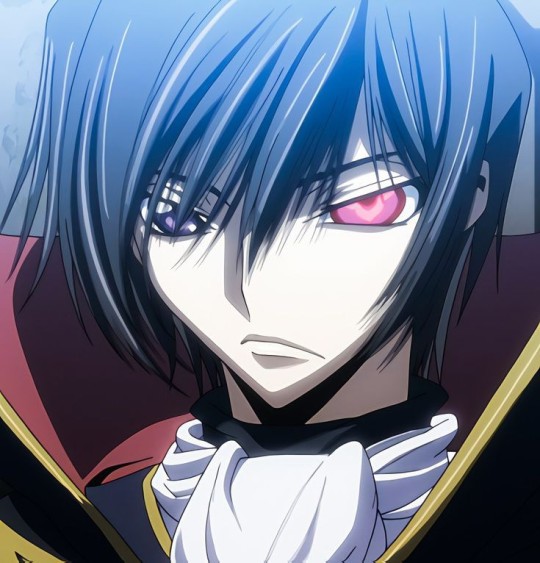

21 notes
·
View notes
Note
Objectively speaking, light is a more compelling character than bakugo 🤷🏽♀️
i think this meant to be bait but i assure you my bakugou glazing is nothing in comparison to my light yagami hating
there are lots of other characters you could make this comparison with. like you could say lawliet or misa is more objectively compelling. in the traditional sense of the word, light just isn't lmao. he has a negative growth character arc and the most satisfying part of that arc is him dying miserable and alone
compelling usually means awe-inspiring or you know, invoking conviction. but light does neither. if you think that's too focused on semantics and you use compelling as a stand-in for interesting, then i guess you could make the argument that he is more interesting. but ill be honest i think the only reason light seems more interesting is because he's narrating the story unreliably. "objectively speaking" he has a similar life to bakugou, with a similarly overinflated ego.
as such, objectively there's nothing all that interesting about a 17 yr old, middle class, suburban popular kid with a good home life and social life being bored. he is an excellent catalyst for the story of death note, and his egoism and god complex make it very interesting. but he is not interesting. his boredom and intelligence and the opportunity the death note are what make death note fun. lets put this guy in situations. but he has a limited world view and lacks depth and nuances. even little touches of humanity that make him well rounded. he's not even evil for evils sake, just genuinely deluded and very boring. he also has virtually no personality aside from being kira. insane maybe but boring. if you want a comparable character who is more interesting then lelouch from code geass is an excellent example, though death note has better story telling.
again that's not to say death note isn't interesting, but it's certainly not lights character that makes it that way. most death note fans agree that the series dies when L dies and that's done with intention, as its meant to hold a mirror up to lights reality.
im not really a bakugou glazer enough to defend him as more interesting. but if you're asking me subjectively, it's a lot more moving to see a kid around the same age and from the same background - humble himself as a result of his failings and develop true and genuine emotional maturity. that might be boring to you and that's okay! but it's certainly more traditionally compelling and very difficult to execute, yet is done very well in bnha which makes him a more interesting character.
death note and bnha are not comparable to begin with though. like death note is one of the greatest animes ever made and lights story is a very well told one. but it's not because he is actually interesting but because he is narrated that way and the Story is narrated. its the way his simplicity snowballs into the dire and unbelievable circumstance, and the way it all ends with him dying a miserable, pathetic and ultimately human death. the circumstances around his simplistic and shallow character that make for a tragic and beautiful show.
bakugou is compelling, because any viewer can derive satisfaction and attachment seeing him become less of a little worthless bastard. his character is in many ways is one of the major moving forces of the bnha story and he would be a fun character in any universe because of his tenacity and general quirks and spirit. the same cannot be said for light. in any world that is not death note is an above average intelligent guy, but just some guy. he sucks
#return to sender#either way it doesnt matter because i hate light and i always will#he sucks lol#but like. light is simply not the character to call compelling or even interesting#a main driving element of death note is that light is neither of these things!!!!#he's actually done so well for himself that he's bored#and the death note appearing really brings out the worst in him#instead of challenging himself he simply immediately decides that he is of divine importance#and boy is it interesting to watch#but he himself? wet cardboard#NOW L / LAWLIET?? NOW THATS A COMPARISON !#or even misa. or mikami. or yamada. or lights dad. literally anyone else i would've been like yeah i can see that#not light though
20 notes
·
View notes
Text
Random Rolo Ramblings 6: Kururugi and Canon


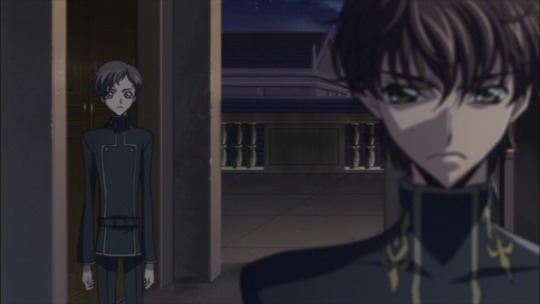
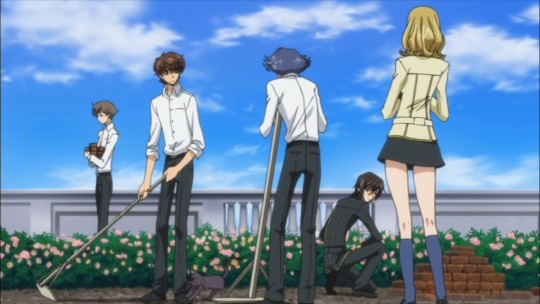
My intention was to write a few lines about the relationship between Rolo and Suzaku and post them around Suzaku's birthday. Well, it did not happen quite like that, but here they are. Admittedly, there is not really much to write about as far as the series canon goes, and here I would already like to digress a little: By '(series) canon' I mean everything that is officially part of the Code Geass story (people, places, events) as it unfolds in the TV series, not the recap films, which divert from the series canon and partly tell a different story. You can consider them a form of Code Geass elseworld or parallel universe/alternate timeline (apparently Genesic Re;CODE did that) or just see them as a separate movie canon which includes Lelouch of the Resurrection. (Correct, 'canon' is the second main topic of this article.)
As far as the Geass series canon goes, it certainly includes R1, R2 and also Akito the Exiled. I would also add the picture dramas, but that is a matter of debate and one could argue that their canonicity is not on the same level as that of the series' episodes. There are also the drama CDs, but, like I wrote before, these are just too far out there to be part of the official story. There may be official books that Sunrise considers canon, but my personal philosophy is that when we talk about films or TV shows, only what's on the screen is canon.
So what about Suzaku and Rolo? If we follow the show's internal chronology, they first meet in the final scene of Akito the Exiled. We get two reaction shots of Suzaku's face, first when Rolo enters the room, accompanied by the two Geass Order guards, then after he tells him that Charles has 'granted' 'Julius Kingsley' another audience. (By the way, look how tall he is in comparison to Suzaku. Must be the boots.) In both cases, Suzaku looks both quite angry and extremely wary. In the first case, Suzaku even makes a hard-to-define moaning sound that sounds both apprehensive and annoyed. In other words, he does not seem happy to see Rolo at all. He might be uncertain at first whether the rescue party are friend or foe, but even after Rolo has made it clear that they are on his side, he looks as happy as an employee who hates his boss and is told that he can go back to work now. This may have nothing to do with Rolo as a person, but with the unpleasantries that await Suzaku and Lelouch, but to me this look also says "Who's that creep they've sent to pick us up?"
Luckily, there are no hard feelings between Suzaku and Rolo in R2 despite this encounter, and this is obviously because R2 was produced before Akito. There is only one conversation between Suzaku and Rolo (and Villetta) in the OSI's secret control room, (which I have covered before, more than once, actually). While Rolo and Villetta have more or less always treated each other as equals, Suzaku clearly acts as the one in charge. Everyone is very polite, but Suzaku seems to be doubtful about the effectiveness of their surveillance, which triggers a response from Roll that makes him appear a little offendes, but secretly he is certainly worried that Suzaku might find out that Lelouch has regained his memories (and that he has changed sides). In a different world, to Star Trek, they may be friends, at least they don't hate each other, but in this situation, Rolo mostly regards Suzaku as a threat, which is why he even offers Lelouch to kill him. When Suzaku arranges a phone call with Nunnally to figure out whether Lelouch has regained his memory, Rolo thwarts his plans with his time-stopping powers. Apart from that, we see him giving Suzaku wary sideways glances, and that, to my knowledge, is about it. Not much, given the fact that older official artwork often shows Lelouch, Suzaku and Rolo as a kind of love-hate-whatever triangle.
What I would really like to know is what happened between the trio's journey home from Euro Britannia and Rolo's/Suzaku's arrival at Ashford. Didn't they have any conversation about 'Julius' resp. Lelouch? It would have made sense for Suzaku to brief Rolo about Lelouch's character traits so that he knows how to handle him and how to play the role of the little brother convincingly. Moreover, the Vincent's design is based on the Lancelot's, would Suzaku not be the perfect tutor for Rolo as a Knightmare Frame pilot? That would also explain Rolo's piloting skills. (Wouldn't it be fun if Lloyd was also involved? Maybe Rolo had a reason to call him "pervy four-eyes" in that infamous sound episode.)

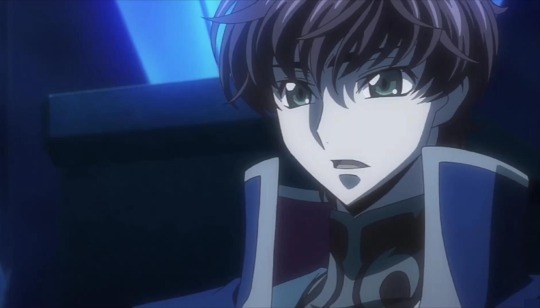
Of couse there is that slightly weird scene in the second recap movie where Bismarck introduces Suzaku to Rolo (who is dressed like an accountant and looks as if he hadn't had any sleep for a week and not seen any daylight for a month, quite the contrast to his Akito outfit and posture) and Villetta. Here it is made more obvious than in R2 that Suzaku is in charge of the operation. In this scene it is also acknowledged that Suzaku and Rolo have met before, and maybe Suzaku's bad memories are the in-story explanation for Suzaku's so bluntly (and rudely) addressing Rolo's faulty Geass, which is one of the things I hated about this scene, the other one being Rolo's new alias ('Nebiros'/'Neblos'). Rolo's resentful look is more than understandable. I know why the writers made Suzaku say that: they needed a quick way to establish Rolo's weakness, but it still seems so out of character for someone like Suzaku. (I like Suzaku thanking Rolo for rescuing them better, even though he did not look particularly grateful when Rolo freed him and Lelouch from prison.) Villetta's defending Rolo and praising his skillfulness, on the other hand, is perfectly in character for her. Anyway, this scene does not contradict series canon, so I can potentially accept it as "this is what happened" to fill a gap in the story, I'm just not sure if I want to.
Which is why I am now turning to the readers. How do you personally deal with the canon problem, in Code Geass and otherwise? After all, reboots, recaps, remakes etc. are a pretty common phenomenon in the world of anime and elsewhere. Do you want to have a rigid canon or do you like to see alternate/new/fresh versions of the same story? What is your personal Code Geass canon, the two seasons of the TV show, Akito, the recap films, Lelouch of the Resurrection, the mobile games? Please let me know and thank you for reading all this, these articles are called "ramblings" for a reason.
P.S. Sorry for mostly using screencaps that I have used before.
25 notes
·
View notes
Text
1923? 2023!
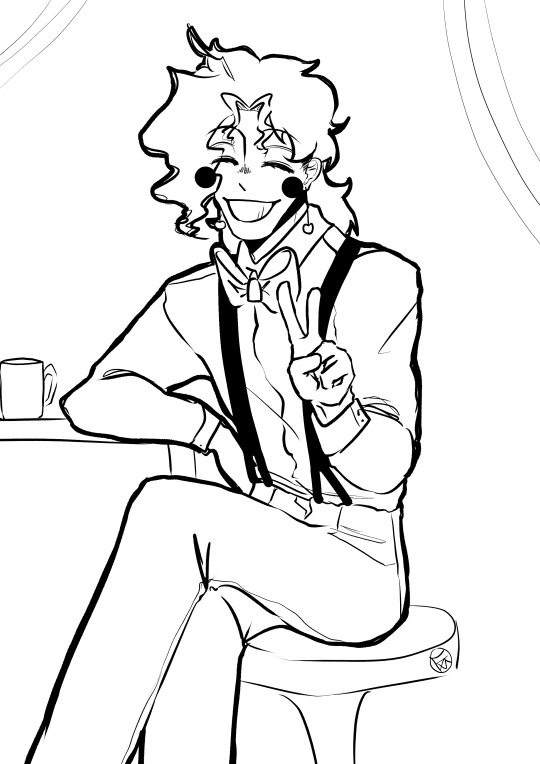
(( Lil update under the cut ))
(( Ok. Wow. It’s been a while-- Hi! UM idk how many of y’all are still active w/ your blogs but I’m more(ish) active on @fixer-png :3
SO first of all-- I go by Lelouch (yes, like the code geass protag) n use he/they pronouns! I really haven’t changed too much since 2019 except I’m really not into jjba anymore and now have tats n piercings. I never said anything publicly(that I currently remember), but my mental health has been so much better compared to when I was active here. I won’t get into it, but a lot happened during that time outside of tumblr n this was a nice escape for me for the time being :)! I’m still really young on this site in comparison to some mutuals (pls don’t be mad at me) :,D but I’m glad I never had a bad experience here ,:3c.
I still draw n cosplay but found a new hobby of car modding (is that the term???). I’m also hoping to start selling merch in the near future; maybe I’ll make a 1920s Kakyoin charm as an homage to this blog.
It’s nostalgic to me looking back at old posts on this and my other ask blog. I thought it’d be nice to post a lil update drawing on this blog? If any mutuals wanna reconnect do feel free to reach out on any platform-- 99% of the time my username is fixer.png, fixer.exe, or some other variation.
I hope you’re all doing well-- especially these past couple of years. Please stay healthy n safe!! <3 ))
15 notes
·
View notes
Text
youtube
Watch the 2024 American Climate Leadership Awards for High School Students now: https://youtu.be/5C-bb9PoRLc
The recording is now available on ecoAmerica's YouTube channel for viewers to be inspired by student climate leaders! Join Aishah-Nyeta Brown & Jerome Foster II and be inspired by student climate leaders as we recognize the High School Student finalists. Watch now to find out which student received the $25,000 grand prize and top recognition!
#ACLA24#ACLA24HighSchoolStudents#youtube#youtube video#climate leaders#climate solutions#climate action#climate and environment#climate#climate change#climate and health#climate blog#climate justice#climate news#weather and climate#environmental news#environment#environmental awareness#environment and health#environmental#environmental issues#environmental education#environmental justice#environmental protection#environmental health#high school students#high school#youth#youth of america#school
16K notes
·
View notes
Text
i understand why the code geass/death note comparisons would get annoying when they're being presented as dead serious but tbh at least when i was a teen and they were both at the height of their popularity it was not that deep. very much their barbarous supersmart pretty boy vs our blessed supersmart pretty boy. whoever wrote that one lelouch/light fic in the livejournal cgkinkmeme was the only truly enlightened person
6 notes
·
View notes
Note
Were the comparisons made in the oughts between death note and code geass silly or justified?
why limit it to one? they were silly and justified
17 notes
·
View notes
Text
Watching Code Geass and hearing all the Durarara!! voice actors got me thinking.
Izaya = Lelouch
Shinra = Suzaku
Nunnally = The twins (Mairu lost her eyesight, Kururi lost her ability to walk)
The comparisons are too real. Angsty smart boys with parent issues and a weird obsession with chess. Younger siblings in their care. Childhood friend who's secretly fucked up and who has caused some weird mixed feelings for angsty smart boy about his intentions. Does this make sense?
I'm just saying.
#Shizuo is Jerimiah because that fight scene where he obsessively chants about getting Zero just#Yep that sounds like Shizuo#felt really bad for him not gonna lie#durarara#drrr#drrr!!#mocknerd#durarara izaya#durarara shizuo#durarara shinra#durarara mairu#durarara kururi#izaya orihara#orihara izaya#shinra kishitani#kishitani shinra#orihara kururi#kururi orihara#orihara mairu#mairu orihara#shizuo heiwajima#heiwajima shizuo#code geass#also no story today#once again college and homework just got in the way
10 notes
·
View notes
Video
youtube
So I'm on board Gundam The Witch From Mercury (G-Witch), Writer Ichiro Okouchi's Return to Sunrise for Original Writing for the first time since Code Geass.
We're two episodes and a prologue in at the moment, so right now we're just hoping the show doesn't go south from a combination of Really Bad Producer/Directorial decisions from them pulling rank against the wishes of Okouchi, or Okouchi trying to reach a preordained ending and working backwards from that to form the story. As both have screwed over series/events he's done before, to the point he disowned the most recent Code Geass Films.
Okouchi has a habit of taking inspiration from Shakespeare for his stories, and it ends up seen in G-Witch; as well as showing the influence of political machinations to harmfully shape the world when such isn't the will of the people. The latter being plainly seen in how a single corrupt man can manipulate the government and economy to basically give himself a controlling monopoly over corporate interests and what technological advancements should be considered 'taboo', and using any means he can to crush any defiant will that opposes his own; ergo the title of 'Witch' given to gundam pilots in this series.
The Fact that said man's daughter is not immune to this says loads how little he cares for anyone's voice or opinion but his own, and I'm hoping whatever Okouchi's planned will permit him to go down hard and open up other stories in this setting; either in a sequel to Suletta's story or entirely dis-staffed ones, since with exception to the 'Build' Gundam series a lot of the AU timeline Gundam series haven't had the capacity for much universe expansion beyond their sidestory manga's/prose stories/apocrypha.
Honestly, I'd take anything to just have less UC timeline stories and Franchise Creator Yoshiyuki Tomino vanity projects clogging up the make of Gundam projects and Sunrise's other series, as in comparison to what has been put out by other creators? Tomino's series have not fared well at all and haven’t since the 80′s; the Cross Ange versus G-Reco incident from 2014 being a reminder of that, doubly so considering the animosity Tomino has voiced towards that series’ Director (Mitsuo Fukada) after years of deliberately screwing over Fukada’s projects, including Tomino’s antics preventing the production of a Movie Fukada’s deceased wife had written for Sunrise years and years before.
Plus, Protagonist Suletta's just Adorable with how socially awkward she is, and her dynamic thus-far with the cast is engaging.
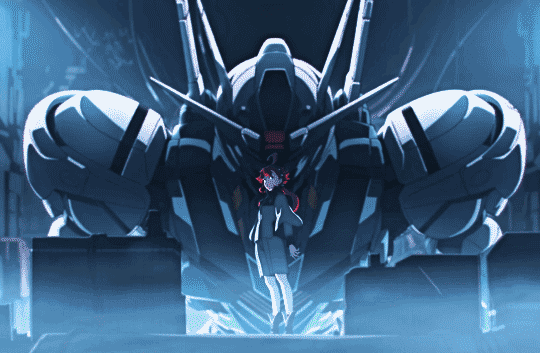
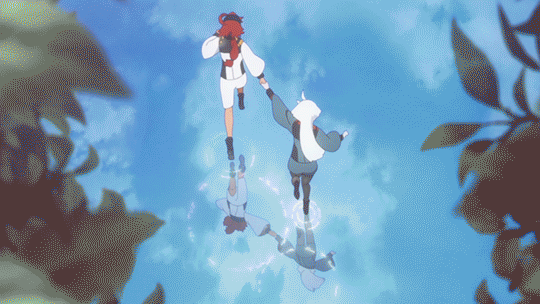
12 notes
·
View notes
Text
youtube
Watch the American Climate Leadership Awards 2024 now: https://youtu.be/bWiW4Rp8vF0?feature=shared
The American Climate Leadership Awards 2024 broadcast recording is now available on ecoAmerica's YouTube channel for viewers to be inspired by active climate leaders. Watch to find out which finalist received the $50,000 grand prize! Hosted by Vanessa Hauc and featuring Bill McKibben and Katharine Hayhoe!
#ACLA24#ACLA24Leaders#youtube#youtube video#climate leaders#climate solutions#climate action#climate and environment#climate#climate change#climate and health#climate blog#climate justice#climate news#weather and climate#environmental news#environment#environmental awareness#environment and health#environmental#environmental issues#environmental justice#environment protection#environmental health#Youtube
16K notes
·
View notes